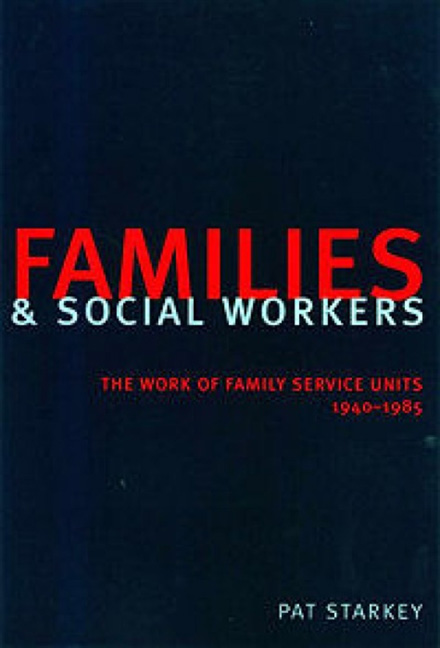Book contents
- Frontmatter
- Contents
- Acronyms and abbreviations
- Introduction
- 1 Pacifist Service
- 2 Problem Families, Eugenics and FSU
- 3 The Growth of a Social Work Agency
- 4 Changes and Adjustments
- 5 Training and Professional Development
- 6 Changing Relationships with the State
- 7 Almost Not An Organisation
- Conclusion
- Bibliography
- Index
2 - Problem Families, Eugenics and FSU
- Frontmatter
- Contents
- Acronyms and abbreviations
- Introduction
- 1 Pacifist Service
- 2 Problem Families, Eugenics and FSU
- 3 The Growth of a Social Work Agency
- 4 Changes and Adjustments
- 5 Training and Professional Development
- 6 Changing Relationships with the State
- 7 Almost Not An Organisation
- Conclusion
- Bibliography
- Index
Summary
The publication of Problem Families in 1945 marked the end of a process of redefinition. The PSUs of Liverpool, Manchester and Stepney, having originated in the activities of a disparate group of conscientious objectors who were united in their aim to engage in humanitarian action which did not further the war effort, had developed into an organisation which had started to lay claim to considerable expertise in social work. Their sense of their own status was both confused and ambitious. Although they referred to themselves as ‘willing volunteers’, their apparent modesty was belied by their assertion that they were also ‘pioneers of social work’. Moreover, the field they had chosen was one that had assumed an urgency in both official and popular circles. This urgency was informed by the sense that the post-war reconstruction of British cities would be adversely affected by the lifestyles of a minority of poor families. PSU's work with such families had attracted the admiration and active support of Lord Balfour as well as medical and welfare workers, and reinforced the sense that the group had embarked on new and effective methods of intervention. FSU faced the post-war world with considerable confidence. Furthermore, as Michael Rustin has shown, the development of the professional status of social work – which accelerated in the decades after the Second World War – was intimately linked to the process of making the family an object of positive social policy. PSU/FSU had, perhaps without realising it, positioned itself within the ambitions of a developing profession and within concerns about the health of the family.
However innovative their methods of working with problem families, PSU workers, and their successors in FSU, had also positioned themselves within a long-standing discussion about poorly functioning families, and were heirs to deeply rooted ideas. Anxiety about the family, which exercised the minds of social commentators and national and local government workers in the 1940s, was part of a recurring pattern. As Jacques Donzelot has noted, the ritual scrutiny of the family as part of an attempt to discover the destiny of the society in which it is set has a long history.
- Type
- Chapter
- Information
- Families and Social WorkersThe Work of Family Service Units 1940–1985, pp. 45 - 76Publisher: Liverpool University PressPrint publication year: 2000



